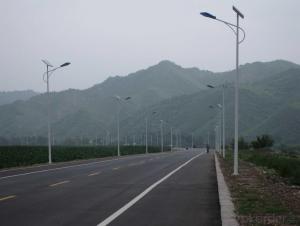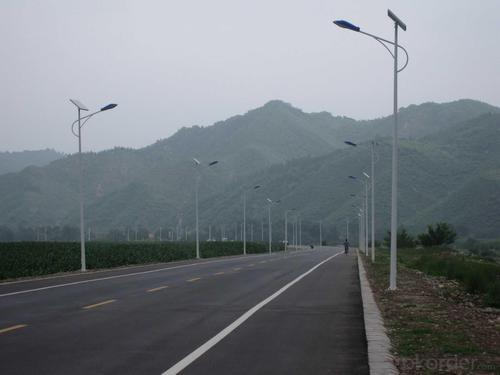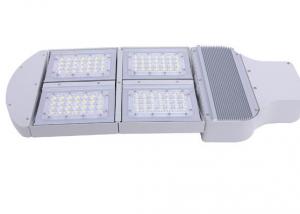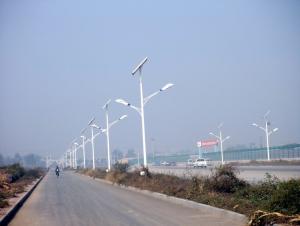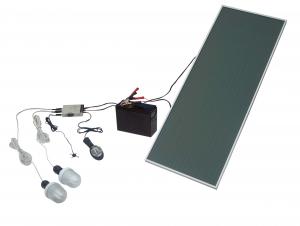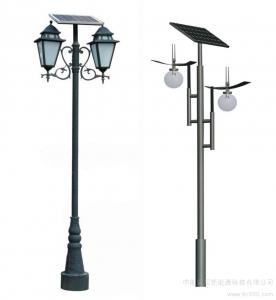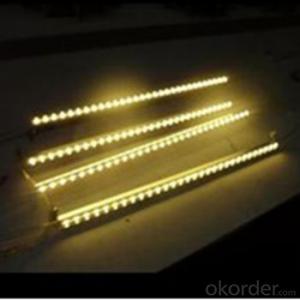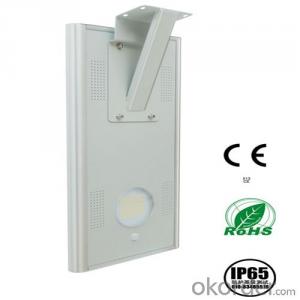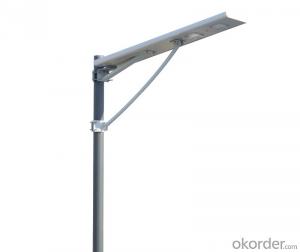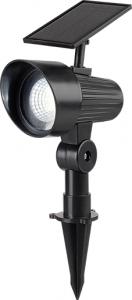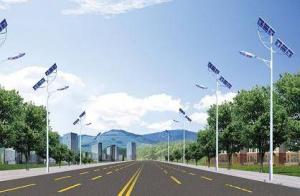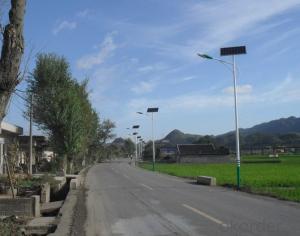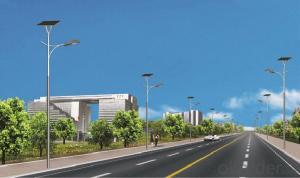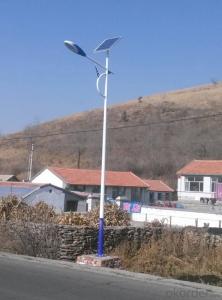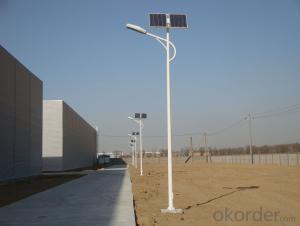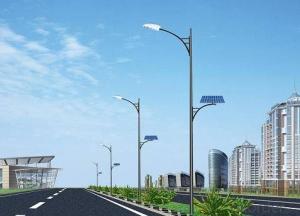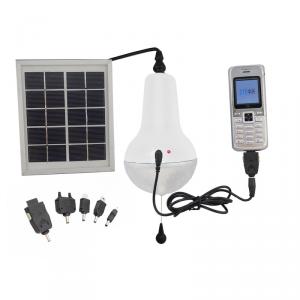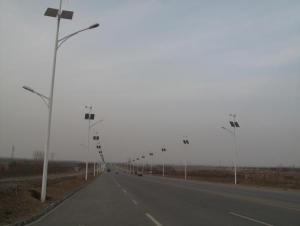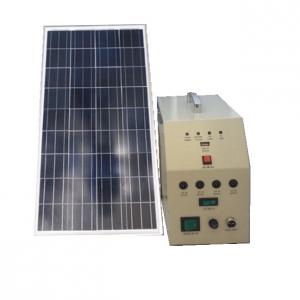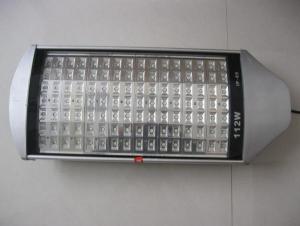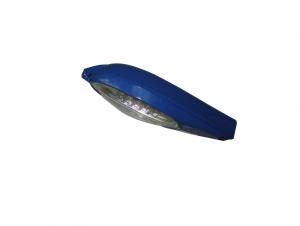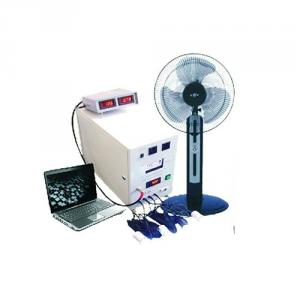Flagpole With Solar Light - Outdoor High Quantity AN-ISSL-45W Solar Street Light
- Loading Port:
- Shanghai
- Payment Terms:
- TT OR LC
- Min Order Qty:
- 1000 watt
- Supply Capability:
- 100000 watt/month
OKorder Service Pledge
OKorder Financial Service
You Might Also Like
Characteristics and Feature
1.Using hight-grade Bridgelux leds, the luminous efficiency is over 120lm/W.
2. Using high efficient monocrystalline solar panels, solar energy conversion rate is 18%.
3. Body sensor can automatically adjust the brightness depending on the crowd change.
4. Using high-quality lithium iron phosphatebattery, the number of charge-discharge cycles is up to 1500-2000.
5. Integrated design can heip to save on shipping, easy installation.
Image
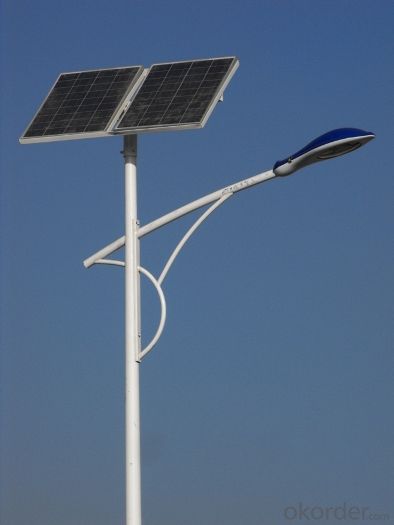
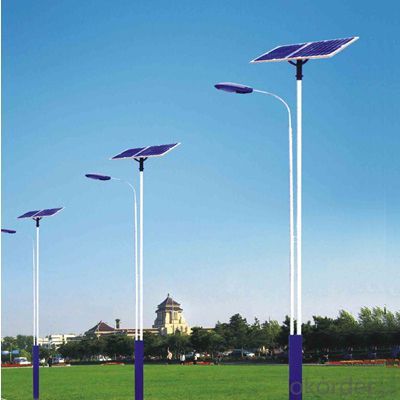
Specification
Model: | AN-ISSL-20W | |
Solar panel | Max power | 18V45W (High Efficiency Monocrystalline Silicon) |
Life time | 25 years | |
Battery | Type | Mottcell Lithium battery(12.8V/20AH) |
Life time | 6 years | |
LED Lamp(with sensor) | Max power | 20W |
led chip brand | Epistar with high brightness | |
lumen (LM) | 2400-2700lm | |
Life time | 50000hours | |
Viewing Angle | 120° | |
Charge time | by sun | 6hours(Strong sunshine) |
Discharge time | full power | ≥10hours |
half power | ≥20hours | |
working Temperature | range( ℃ ) | -30℃~+70℃ |
color temperature | range(k) | 3500-6500k |
mounting height | range (m) | 5-6m |
space between light | range (m) | 18-20m |
Lamps material | aluminium alloy | |
Product size | 920*330*140mm | |
Product weight | 12.5kg | |
Certificate | CE / ROHS | |
warranty period | 5 years | |
Models
Model | Solar Panel | LED Lamp | LED Chip | lumen (LM) | Product size | Charge time |
AN-ISSL-8W | 18V15W | 8W | Epistar | 960-1080lm | 540*320*55mm | 6 hours |
AN-ISSL-12W | 18V18W | 12W | Epistar | 1440-1620lm | 540*320*55mm | 6 hours |
AN-ISSL-15W | 18V/30W | 15W | Epistar | 1800-2025lm | 710*350*55mm | 6 hours |
AN-ISSL-20W | 18V45W | 20W | Bridgelux | 2400-2700lm | 920*330*140mm | 6 hours |
AN-ISSL-25W | 18V50W | 25W | Bridgelux | 3000-3375lm | 1170*330*140mm | 6 hours |
AN-ISSL-30W | 18V60W | 30W | Bridgelux | 3600-4050lm | 1170*330*140mm | 6 hours |
AN-ISSL-40W | 18V60W | 40W | Bridgelux | 4800-5400lm | 1170*330*140mm | 6 hours |
AN-ISSL-45W | 18V65W | 45W | Bridgelux | 5652-6075lm | 1180*325*143mm | 6 hours |
AN-ISSL-50W | 18V70W | 50W | Bridgelux | 6000-6750lm | 1200*380*160mm | 6 hours |
AN-ISSL-60W | 18V80W | 60W | Bridgelux | 7200-8100lm | 1200*380*160mm | 6 hours |
AN-ISSL-80W | 18V100W | 80W | Bridgelux | 9600-10800lm | 1200*520*160mm | 6 hours |
Guarantees
Certificates TUV , VDE, CE
FAQ
1. Q: Do you have your own factory?
A: Yes, we have. Our factory located in Jiangyin city, jiangsu province.
2. Q: How can I visit your factory?
A: Before you take off from your country, please let us know. We will show you the way, or arrange time to pick you up if possible.
3. Q: Do you provide free sample?
A: Usually we do not offer free sample
4. Q: Could you print our company LOGO on the nameplate and package?
A: Yes, we can do that.
- Q: Are solar lights adjustable?
- Yes, solar lights are adjustable.
- Q: Are there solar lights for outdoor farms or agricultural fields?
- Yes, there are solar lights specifically designed for outdoor farms or agricultural fields. These lights utilize solar panels to convert sunlight into electricity, which is then used to power the lights. They are a sustainable and cost-effective solution for illuminating outdoor farm areas, ensuring visibility during nighttime activities and enhancing security.
- Q: Can solar lights be used for illuminating outdoor dining areas?
- Yes, solar lights can be used for illuminating outdoor dining areas. Solar lights are a sustainable and environmentally friendly option for outdoor lighting. They rely on sunlight to charge their batteries during the day, and then they automatically turn on at night to provide illumination. Solar lights are typically easy to install and require no wiring, making them a convenient choice for outdoor dining areas. Additionally, many solar lights are designed with different brightness levels and settings, allowing you to adjust the lighting to create the desired ambiance for your dining area. Overall, solar lights are a great option for illuminating outdoor dining areas, providing both practical and aesthetic benefits.
- Q: Can solar lights be controlled with a remote?
- Yes, solar lights can be controlled with a remote. Many solar lights come with remote control options that allow users to adjust the brightness, switch the lights on or off, and even change the lighting modes from a distance. This feature provides convenience and flexibility in managing outdoor lighting systems powered by solar energy.
- Q: Are solar lights suitable for bus stops and shelters?
- Yes, solar lights are suitable for bus stops and shelters. They are a cost-effective and environmentally friendly option that can provide illumination during the night, improving safety and visibility for passengers waiting at bus stops and shelters. Additionally, solar lights require minimal maintenance and can be easily installed in remote locations where electricity may not be readily available.
- Q: Can solar lights be used for public transportation stops or stations?
- Yes, solar lights can be used for public transportation stops or stations. Solar lights are a sustainable and energy-efficient lighting solution that can be easily installed in outdoor spaces, including transportation stops and stations. They are powered by the sun, which means they do not require electricity from the grid, making them a cost-effective and environmentally friendly option. Solar lights can provide adequate lighting for these areas, ensuring the safety and convenience of commuters, especially during nighttime hours. Additionally, solar lights are low maintenance and can operate for long periods without needing replacement or frequent maintenance, making them an ideal choice for public transportation stops or stations.
- Q: Can solar lights be used for outdoor advertising and signage?
- Yes, solar lights can be used for outdoor advertising and signage. Solar lights are a sustainable and cost-effective option for illuminating outdoor signs and displays. They are powered by solar energy, which means they do not rely on electricity from the grid and do not contribute to carbon emissions. Solar lights are easy to install and require minimal maintenance. They can provide consistent and reliable lighting for outdoor advertising and signage, making them visible even during nighttime hours. Additionally, solar lights can be customized to meet specific advertising needs, such as different colors or flashing patterns, making them a versatile choice for outdoor advertising and signage.
- Q: Can solar lights be used for patio or deck lighting?
- Yes, solar lights can be used for patio or deck lighting. They are a convenient and eco-friendly option as they harness energy from the sun during the day and automatically illuminate the area at night. They come in various designs and styles, making them perfect for enhancing the ambiance of outdoor spaces.
- Q: Can solar lights be used for pool and pond lighting?
- Yes, solar lights can be used for pool and pond lighting. Solar-powered lights are a great option for pool and pond lighting as they do not require any electrical wiring and can be easily installed. They harness energy from the sun during the day and automatically illuminate the pool or pond area at night. Additionally, solar lights are energy-efficient and environmentally friendly, making them a popular choice for outdoor lighting solutions.
- Q: Can solar lights be used for outdoor fishing or boating docks?
- Yes, solar lights can be used for outdoor fishing or boating docks. Solar lights are a popular and effective choice for illuminating outdoor spaces, including docks, as they are easy to install, require minimal maintenance, and can provide reliable lighting even in remote areas. Additionally, solar lights are energy-efficient and environmentally friendly, making them a sustainable lighting solution for outdoor activities such as fishing or boating.
Send your message to us
Flagpole With Solar Light - Outdoor High Quantity AN-ISSL-45W Solar Street Light
- Loading Port:
- Shanghai
- Payment Terms:
- TT OR LC
- Min Order Qty:
- 1000 watt
- Supply Capability:
- 100000 watt/month
OKorder Service Pledge
OKorder Financial Service
Similar products
Hot products
Hot Searches
Related keywords
